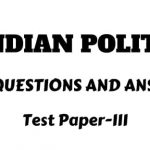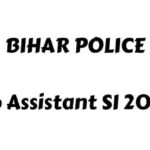India Constitution Test Papers Question Answers for UPSC Examinations
Test Paper-IV
India Constitution Practice Test Papers 2020: Learn Indian Polity for Civil Services Examination, SSC, Group I, Group II and Railways examination with MCQ question and answer, Get complete 60 practice Test papers ebook from Fdaytalk ebooks
50 India Constitution MCQ Practice MCQ Questions
Indian Polity Test Paper IV
1) losing citizenship according to citizenship act, 1955 is
a) Renunciation
b) Termination
c) Deprivation
d) All The above
ANS: d) All The above
2) Which part & articles deals with fundamental rights
a) Part III, article 12 to 36
b) Part III, article 12 to 37
c) Part III, article 12 to 35
d) Part II, article 12 to 35
ANS: c) Part III, article 12 to 35
3) Fundamental rights in the constitution is taken from sources
A) Bill of Rights, USA
B) Bill of Right, Uk
c) Bill of Right, France
D) Bill of Right, Germany
ANS: a) Bill of Rights, USA
4) Which part of the constitution is known as Magna Carta of India
a) PART I
b) PART II
c) PART III
d) PART IV
ANS: c) PART III
5) Originally, the constitution of India has how many Fundamental rights?
a) 5
b) 7
c) 8
d)9
Ans: b) 7
6) Which article deals with the right to equality?
a) Article 14 to 18
b) Articles 15 to 18
c) Articles 14 to 18
d) Articles 15 to 17
ANS: a) Article 14 to 18
7) Which article deals with the right to freedom
a) Articles 19 to 20
b ) Articles 19 to 21
c) Articles 19 to 22
d) Articles 19to 23
ANS: c) articles 19 to 22
8) Which Article deals with right against exploitation?
a) Articles 23 to 24
b) Articles 22 to 24
c) Articles 22 to 23
d )Articles 21 to 24
ANS: a) Articles 23 to 24
9) Which articles deal with the right to freedom of religion?
a) Articles 22 to 24
b) Articles 23 to 25
c) Articles 23 to 24
d) Articles 23 to 30
ANS: c) Articles 23 to 24
10) Which articles deals with right to property
a) Articles 31
b) Article 32
c) Article 33
d) Article 300A
ANS: a) Articles 300A
12) Which articles deal with right to constitutional remedies?
a) Articles 31
b) Article 32
c) Article 33
d) Article 34
ANS: b) Article 32
13) Right to property is deleted from fundamental right by?
a) 42nd Amendment act, 1978
b) 44th Amendment act, 1978
c) 44th Amendment act, 1976
d) 42nd Amendment act, 1976
ANS: b) 44th amendment act, 1978
Note: Right to property is made leagl right under Article 300 A in Part XII
14) Fundamental rights were restricted or abrogated by Article 33 to which of the following groups or members ?
a) Members of armed force
b) Paramilitary forces
c) Police forces & Intelligence agencies
d) All the above
ANS: d) All the above
15) Which article describes definition of State ?
a) Article1
b) Article 17
c) Article 12
d) Article 14
ANS: Article 12
16) Which article deals with abolition of untouchability &prohibition of its part
a) Article 16
b) Article 17
C) Article 18
d) Article 19
ANS: b) Article 17
17) “Rules law” propounded by
a) A.V Dicey
b) B.R Ambedkar
C) A.V Dicey William
d) None of the above
ANS: a) A.V Dicey
18) President of India and government of state enjoys immunities under?
a) Article 360
b) Article 361
c) Article 362
d) Article 363
ANS: b) Article 361
19) President of India & Governor immune from criminal proceeding against them during?
a) Term of office
b) Life time of office
c) Both
d) None of the above
ANS: a) Term of office
20) By which article a member of parliament is not liable to any proceeding in any court in respect of anything said (or) any vote given by him parliament
a) Article 102
b) Article 103
c) Article 104
d) Article 105
ANS: d) Article 105
21) Foreign sovereigns; ambassadors and diplomats enjoy immunity from
a) Criminal proceeding
b) Civil proceeding
c) Both
d) None of the above
ANS: c) Both
22) Which commission recommended for reservation of 27% government jobs for OBC’s
a) Mandal commission
b) Ram Nandan committee
c) National Commission for backward classes
d) All the above
ANS: a) Mandal commission
23) In which National commission for backward classes was established?
a) 1992
b) 1993
c) 1994
d) 1995
ANS: b) 1993
24) Which commission is appointed to identify creamy layer among the OBC’S
a) Mandel commission
b) Ram Nandan committee
c) National Commission for backward classes was established?
d) All the above
ANS: b) Ram Nandan committee
25) Which article deals with abolition of titles?
a) Article 15
b) Article 16
c) Article 17
d) Article 18
ANS: d) Article 18
26) National Awards were instituted in the year?
a) 1951
b) 1952
c) 1953
d) 1954
Ans : d) 1954
27) According to Article 19 of the constitution of India, every citizen of India as
a) 5 rights
b) 6 rights
c) 7 rights
d) 8 rights
ANS: b) 6 rights
28) Rights under article 19
a) Right to freedom of speech and expression
b) Rights to assemble peacefully and without arms
c) Rights to form associations or unions
d) Right to move freely throughout India
e) Right to reside and sette in any part of India
f) Right to practice any profession or do any business, trade, occupation
29) Which article provides protection against arbitrary and excessive punishment to an accused person
a) Article 18
b) Article 19
c) Article 20
d) Article 21
ANS: c) Article 20
30) Article 20 of the constitution of Indian provides protection to?
a) Only Indian citizens
b) Foreigners
c) Company or Corporation
d) All the above
ANS: d) All the above
31) What is meant by Ex – Post – Facto law?
a) No person shall be convicted of any offense except for violation of a law in force at the time of the commission of an Act
b) No person shall subjected to a penalty greater than that prescribed by the law in force at the time of the commission of an Act
c) A & B
D) No law after or before an Act
Ans: c) A & B
32) What is meant by Double Jeopardy?
a) No person shall be prosecuted & punished for same offense more than once
b) No person shall be prosecuted & punished for the same offense more two time
c) No person shall be prosecuted & punished for the same offense more than three times
D) No person shall be prosecuted & punished for the same offense more than four times
ANS: a) No person Shell be prosecuted & punished for same offense more than once
33) What is meant by self – incrimination?
a) No person accused of any offense shall be compelled to be witness against himself
b) No person accused of any offense shall be compelled to be witness against others
c) No person accused of any offense shall be compelled to be witness against self others
d) None of the above
ANS: a) No person accused of any offense shall be compelled to be witness against himself
34) Protection against Double Jeopardy is available in?
a) Police sation
b) Proceedings before court law
c) Final judgment of court
d) All the above
ANS: b) Proceedings before court law
35) The famous Gopalan case, 1 950 and Menaka case 1978 were regarding?
a) Article 20
b) Article 21
c) Article 22
d) Article 23
ANS: b) Article 21
36) Article 21 of the constitution of Indian deals with
a) Right of elementary education
b) Right of citizenship
c) Protection of life & personal liberty
d) Protection in respect of convictions
ANS: c) protection of life & personal liberty
37) Right to education, Article 21-A declares state shall provide free & compulsory education to all children of
a) Age 6 to 13 yrs
b) Age 6 to 15 yrs
b) Age 6 to 14 yrs
c) Age 6 to 14 yrs
d)Age 6 to 12 yrs
ANS: c) Age 6 to 14 yrs
38) Right to education added in constitution of India by
a) 86th constitution amendment act 2002
b) 87th constitution amendment act 2002
c) 88th constitution amendment act 2002
d) 89th constitution amendment act 2002
ANS: a) 86th constitution amendment act 2002
39) Which article of constitution of Indian grants protection to the person who are arrested or detained?
a) Article 19
b) Article 20
c) Article 21
d) Article 22
ANS: d) article 22
40) Article 22 of the constitution of India gives protection to person who were arrested and it is applicable to
A) To all citizens of India
b) Foreigners
c) Detained under PD act
d) All the above
ANS: A) to all citizens of India
41) Which Article deals with prohibition of human traffic, beggars, forced labour
A) Article 21
B) Article 22
c) Article 14
D) Article24
ANS: c) Article 14
42) Which Article deals with equality before the law?
A) Article 21
B) Article 22
c) Article 14
D) Article 24
ANS: c) Article 14
43) Which Article deals with the prohibition of discrimination on grounds of religion, race, caste, and sex
a) Article 21
b) Article 22
c) Article 14
d) Article 15
ANS: Article 15
44) Which Article deals with the abolition of Untouchability?
a) Article 17
b) Article 18
c) Article 19
d) Article 20
ANS: a) Article 17
45) Which Article deals with the protection of interests of minorities
a) Article 23
b) Article 29
c) Article 25
d) Article 30
ANS: Article 29
46) Which Article deals with the freedom to manage religious affairs?
a) Article 24
b) Article 25
c) Article 26
d) Article 27
ANS: C) Article 26
47) Which Article deals with the abolition of titles?
A) Article 15
B) Article 18
C) Article 17
D) Article 16
ANS: b) Article 18
48) Which Article deals with the definition of state
a) Article 35
b) Article 36
c) Article 37
d) Article 38
ANS: Articles 36
49) Which article deals with equal justice & free legal
a) Article 39A
b) Article 39B
c) Article 39C
d) Article 39D
ANS: a) Article 39A
50) Which article deals with union civil code for citizens
a) Articles 41
b) Articles 44
c) Articles 47
d) Articles 50
ANS: Article 44
Learn More India Constitution Practice Test Papers
Link 1: Indian Polity and constitution Practice Test Papers
Link 2: Indian Polity Notes 2020 Download
Link 3: GK 2020 PDF Book Download

